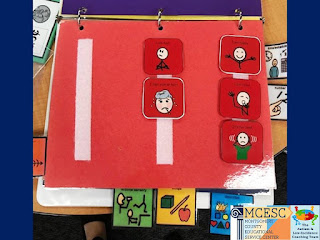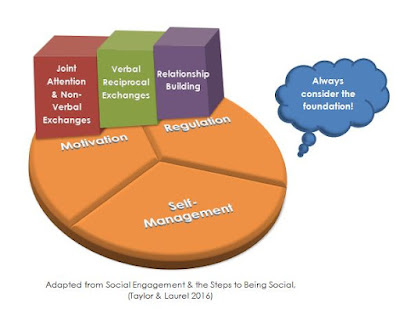Are you working with a nonverbal student who is just beginning to develop basic skills such as maintaining attention to an activity, parallel play, and joint attention with a partner?
Are you working with a verbal student who struggles with conversational skills and body language?
No matter the level you always need to look at the foundation. Today's Sensational Social Skills will examine each part of this essential foundation and provide a variety of examples from our regional classrooms!
The Foundation
In the book, Social Engagement & the Steps to Being Social, (Taylor & Laurel 2016) the importance of creating a foundation on which to build all reciprocal communication and social engagement is illustrated. It is important to monitor and support the foundation when working on developing communication and social skills. We organized the foundational supports into 3 categories:
- Regulation- If your student is dysregulated, they may not be available for engaging at any level. Monitor your student’s regulation by considering the following:
- Environmental Distractions (reduce visual and auditory distractions)
- Space (reduce the space by creating visual and physical boundaries)
 |
| Rylie Jarrett Stevenson Elementary, Mad River |
- Organization (organize the space and develop a predictable routine for interaction)
 |
| Rachel Hatton Normandy Elementary, Centerville |
- Biological (your student may be thirsty, hungry, tired, hot, or cold)
- Sensory Input (incorporate movement or deep pressure/heavy work)
 |
| Heidi Horner Miami County ESC |
 |
| Heidi Horner Miami County ESC |
- Emotional State (find out what your student is upset about to validate and provide encouragement)
 |
| Wh-Question Flipbook |
- Touch (avoid unexpected touch or too much hand-over-hand prompting)
- Slow it down (just sit quietly and wait allowing pauses in the activity)
- Motivation- It is hard to gain joint attention when the student has no interest in the activity. Try to develop shared pleasure in the activity:
- If your student is verbal. Ask questions or just listen to find out their interests. Incorporate these interests into the activity.
- Build interest by incorporating humor and playful fun into your activity.
- If your student is nonverbal, discover what they like by presenting a variety of activities. Follow their lead. Model the activity with animated gestures and sounds/words. Imitate their actions or sounds.
 |
 |
| Paula Taulbee Mad River ECEC, Mad River |
- Building anticipation can peak interest. Consider games that build anticipation such as these:
 |
| Beth Young Snyder Park Elementary, Springfield |
- Do an interests inventory or send home a parent questionnaire to identify student interests. Click the image below to get a free reinforcement checklist to send home to parents:
- Develop a plan to reinforce reciprocal interaction.
- Self-Management- Even when they are regulated and motivated, your students may struggle to be purposeful in their actions. A study by Kogel, Park, & Kogel (2014) found that self-management supports and interventions were effective in increasing reciprocal social conversation for students on the autism spectrum. Self-management supports and interventions may include:
- Predictable routines with clear expectations
- Repeated practice in a fun structured setting with transfer to other settings
- Priming
 |
| Jackie Vollmer Driscoll Elementary, Centerville |
- Peer Mentor Modeling
 |
| Mandy Violet Brantwood Elementary, Mad River |
 |
| Casey Morter Mad River ECEC, Mad River |
- Visual Cues for verbal language and nonverbal expectations
- Sentence Strips to cue scripts
- Picture prompts
 |
| Amy D'Amico MCESC, Learning Center- North |
- Schedules/Checklists
 |
| Kristina Neuhart Mad River ECEC, Mad River |
- Cognitive Behavioral Intervention to develop self-awareness/advocacy and awareness of others. Visit our Sensational Social Skills Blog for ideas. Click the images below to find our Respond to Others post with corresponding handouts!
 |
| Miranda Riggs Mad River ECEC, Mad River |
 |
| Erika Lauterbach Dixie Elementary, New Lebanon |
 |
| Greenville Middle School |
 |
| Heidi Horner Miami County ESC |








No comments:
Post a Comment